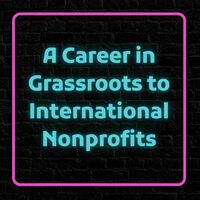A Career in Grassroots to International Nonprofits

- Who: Nathaly Espitia Diaz
- Date: Wednesday, May 24
- Time: 12pm EDT / 4pm UTC (What time is it in my city?)
- Language: English
- Location: Zoom
RSVP: https://digitalrights.formstack.com/forms/welcometodigitalrights
A Career in Grassroots to International Nonprofits in Digital Rights
Nonprofits and grassroot organizations play a key role in the digital rights field. Their programming goals run the gamut, but overall are responsible for supporting frontline activists and efforts advancing different types of issues. Roles at both nonprofits and grassroots are also diverse - from finance to communications to program monitoring.
Hear about Nathaly Espitia Diaz journey from frontline activist to working at Colombian grassroot org (Nois Radio) to now being program officer at Internews. Find out what working in a nonprofit in the digital rights field is like, the types of opportunities exist, and what skills are needed.
Speaker:
Nathaly Espitia Diaz works at the intersection of technology, communication, culture, environment and social change. She excels as a content creator and communication and advocacy strategist, currently serving as Program Officer for South America at Internews. She works developing projects related to Digital Rights and Internet Freedom as well. One of the co-funders of the alternative communication collective Noís Radio. The majority of her work centers around working with indigenous, Afro-descendant, and campesinos communities, an area in which she has almost 15 years of experience. Creator and coordinator of Convite noisradio.co/convite just to facilitate the amazing work the community does.
Notes & Resources
Recordings & Resources
We will post the recordings very soon!
Resources
- Convite: noisradio.co/convite
- Volcanicas: https://www.instagram.com/volcanicasrevista/
- Resumenerd: https://www.resumenerd.com/
Q&A Section
What is one thing I can do to demonstrate my interest in social justice to potential recruiters?
Is important to meet people and be part of the events in your city and far from your city, if you have the funding. You have to talk to people there, to go to panels, even to propose panels. If they feel that you are passionate about what you're doing, they will be interested in you.
People usually just send an email to the manager to see if they have vacancy, or just to send their resume. You can do this and you can follow the same strategy with people you meet during events.
In which ways do you bring the needs and values of your Latina community or as a Latina into an international organisation such as Internews?
You have to be very careful when you work with international organizations. You create friendships and you have to take care of them so what the funder is looking for doesn't hurt the community. I am a good connection for the community since I try to step out for them when needed, I will take care of them, I can be trusted. This value of being an ethical leasure.
Defending having boundaries, having personal life, to respect schedules is very important.
I bring the value of respecting the latin america timing, which is not understood so many times.
What helped you prepare for your current job?
When you live outside the big cities of Colombia is really hard to get funding. I applied for so many open calls, funding, programs... we were constantly proposals and grant applications. It is exhausting to be as creative all the time. But this is how I started and it prepared me for what I do now, being creative. I try to connect my organization with my communication/creative contacts.
How do we leverage our lived experiences and community service when applying o International organizations? How to better represent yourself on resume pertaining to transferable skills and experiences?
You have the opportunity to put links on the resume. Look at the hiring managers and how they speak. Try to transform your skills in corporate language: check their website and check the language. Combine this with the language of your communities, the folks you're working with, with your project and your style. You have to find the balance.
Could you share a bit more about some of your Nois radio programming? How you think radio can help further rights issues?
We use the co-creation and co-designing methodology (minga). We create the teams with the people that are part of Convite, even with the two facilitators that we have. Convite has different stages: diagnosis with artists, leaders, migrants, etc. We never know our names and they tell us their needs (digital, physiscal, and psychosocial). We invite them to a traning so we adjust the methodologies. We record some stuff during different jam sessions and we create a sound postcards. They send questions to the digital rights trainers, then the trainers send a question to the community. We create a conversation over sound postcards.